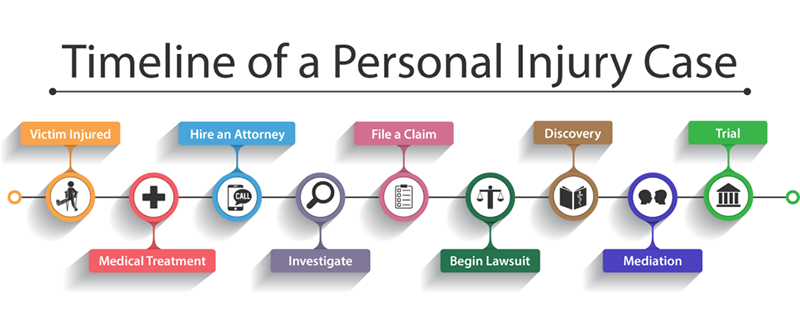A personal injury claim is a type of tort, which is a civil “wrong” that is the basis for a lawsuit. This happens when someone has suffered an injury due to the actions or inaction of another, and the injured party is entitled to receive compensation.
When this occurs, you may seek just compensation from another person or party for causing your accident. In most cases, a personal injury claim seeks monetary recovery from an individual or company’s insurance policy.
Bringing A Personal Injury Claim
If you or someone you love has been injured due to the negligence of another, you may have the ability to bring a claim for damages in order to offset the costs associated with the injury and compensate the injured victim for their pain and suffering, economic damages, property damage, medical costs, lost wages, and other costs you or your family incurred as a result of the injury.
Plaintiff
The plaintiff is the person or organization who initiates a lawsuit. In a personal injury claim, the plaintiff is the person who was injured. In the case of someone who is unable to act for themselves or a wrongful death claim, the plaintiff is the person legally entitled to act on that person’s behalf, the deceased’s behalf, and/or the estates behalf.
Defendant
The defendant is an individual and/or an organization that may be in some way responsible for causing the injury. Based on the circumstances of the case, there can be more than one defendant.
Elements of a Personal Injury Claim
Personal Injury cases arise out of an area of law called negligence. When you sue someone for injuries from an accident, you are bringing a cause of action, or claim, for negligence. Negligence is the failure to exercise reasonable care under the circumstances. There are several important elements that must be established in order to prove negligence.
1. The Defendant Had A Duty
In order to show a defendant was negligent, there must be a duty owed towards the plaintiff. A duty means a level of care. In general, everyone has a duty to use reasonable care. The courts typically measure whether something was reasonable based on how an ordinary prudent person would have acted under the same circumstances.
2. The Defendant Breached The Duty
Secondly, the defendant must have breached the duty owed to the plaintiff. In other words, the defendant either acted, or failed to act, in the same manner as a reasonable person. If an action taken by an individual was not what an ordinary prudent person would have done under the circumstances, then that individual may be have breached the duty of care.
3. The Defendant’s Breach Caused an Injury
A breach of a duty is not enough for a successful personal injury claim; the breach itself must have been the proximate cause of an injury.
Proximate causation deals with foreseeability as the duty of care required in a particular circumstance. A proximate cause” means that the negligent conduct was an efficient cause of your injury, that is, a cause which necessarily set the other causes in motion and was a substantial factor in bringing about injury. “A proximate cause” is any cause which in a natural and continuous sequence produces the result complained of. “A proximate cause” the negligence of a defendant need not be the only cause of injury, there can be other causes as well. However, to be “a proximate cause” the negligence must be at least a substantial factor in bringing about or causing that result.
4. The Injury Resulted in Damages
Finally, the injury that occurred due to the breach of the defendant’s duty must have resulted in some type of harm, either physical or emotional. There are a variety of different categories damages can fall into, including medical expenses (such as hospital stays, medical procedures, and things such as rehabilitation and/or psychiatric services), lost wages (time you were unable to work due to an injury) physical pain and suffering (experts use a variety of formulas based on the severity of the injury to come up with a monetary sum), disability/disfigurement (for example, if an injury left you with a permanent loss of motion), and many more.
Dealing With Insurance Companies
In a vast majority of personal injury cases, insurance companies will come into play. Depending on the nature of the injury, these could be auto insurers, property/site inspectors, medical adjusters, and many more. At times insurance claims adjusters can appear incredibly empathetic, but remember that they are never acting in your best interests. Their primary goal is to limit the financial payout or delay any future payment.

Don’t Negotiate With Insurance Companies Alone
If you or someone you know has been injured, the process you’re facing can be incredibly complex and time consuming. You should focus on recovery, not dealing with insurance adjusters and paperwork. Please call my office at 908-264-7701 for a free strategy session. I am a NJ injury lawyer, and am always happy to take the time to discuss your case in detail.

